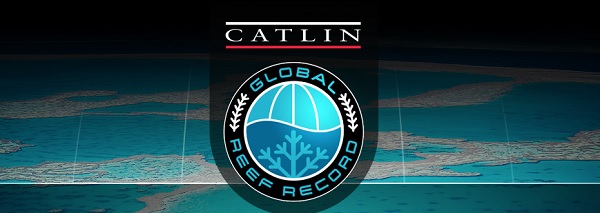Catlin Establishes Coral Reef Global Database
[Updated with video] Bermuda-based Catlin Group Limited, the international specialty property/casualty insurer and reinsurer, has established the Catlin Global Reef Record, a first-of-its-kind global database and online standardized research tool relating to major coral reef ecosystems.
For the past two years, Catlin has sponsored the Catlin Seaview Survey, a pioneering scientific expedition revealing the state of the world’s coral reefs. The Catlin Global Reef Record reaffirms Catlin’s commitment to sponsoring impartial scientific research regarding the risks that society will face in the future, particularly environmental risks.
The Catlin Global Reef Record will enable scientists around the world to collaborate on understanding changes to coral reefs and related marine environments as a result of over-exploitation, pollution and climate change. It is estimated that 500 million people globally depend on coral reefs for food and income and between one-third and one-half of corals around the world have been lost in the last 50 years.
Revealing the Reefs
Freely available to the scientific community and the public at large, the Catlin Global Reef Record features hundreds of thousands of 360-degree panoramic images along with numerous other additional scientific data sets. The Catlin Seaview Survey team collected the groundbreaking images and data during expeditions of the Great Barrier Reef, coral reefs across the Caribbean and its most recent expedition in Bermuda, which launched on September 18.
Beyond the Catlin Seaview Survey images and data, the Catlin Global Reef Record also incorporates critical data and research methods on coral reef health from a host of scientific collaborators to establish a much-needed common methodology in research and measurement.
These key collaborators include:
- The Global Change Institute [GCI] at The University of Queensland in Australia, which is focused on bringing together multidisciplinary expertise to contribute solutions to major global challenges in areas such as climate change, oceans, food security and renewable energy technology. GCI scientists are leading the gathering of the scientific data around the world, and the analysis of that data.
- The National Oceanic and Atmospheric Administration (NOAA), which is incorporating its Coral Reef Watch data cross the Catlin Global Reef Record. Specifically, all reefs recorded by the Catlin Seaview Survey are being set up as a virtual station, which is like having a temperature sensor in the water next to a reef, but it is completely based on satellite remote sensing measurements. Users can access up-to-date maps showing global sea surface temperatures, thermal stress and coral bleaching alerts, automated email systems will signalwhen ocean temperatures grow dangerously high for corals.
- Scripps Institution of Oceanography at UC San Diego. Scientist, David Kline, is working with GCI to develop autonomous assessments of the hundreds of thousands of panoramic images taken of the reefs using their sophisticated semi-automated image recognition software to analyse the per cent coverage of the main benthic organisms [e.g. corals, algae, other invertebrates] in the photographs.
- The World Resources Institute, which is incorporating data and findings from its seminal “Reefs at Risk” reports. More information can be found here.
By hosting standardized scientific data across important coral reef regions worldwide, the Catlin Global Reef Record will set a benchmark that will support and host follow-up monitoring programs. Within the next two years, the Catlin Global Reef Record will also include Catlin Seaview Survey baseline visuals and data from Southeast Asia, the Indian Ocean, the Middle East, and the Pacific, in addition to the surveys already completed in Australia and the Atlantic region [Bermuda and Caribbean]. Over time, the Catlin Global Reef Record will also seek to expand to other reef related datasets, becoming the central resource for data regarding the world’s most biologically diverse yet highly threatened ecosystems.
The launch of the Catlin Global Reef Record is prescient in that it falls just before the release of the first working group report of the Intergovernmental Panel on Climate Change [IPPC] 5th Assessment Report. This important document will report the scientific consensus on the physical and chemical changes of oceans associated with the rise of greenhouse gases such as carbon dioxide. Studies all over the world are finding that oceans are storing the excess heat associated with human caused climate change and are becoming more acidic – damaging marine life and changing ecosystems such as coral reefs.
“Our oceans are in an unprecedented state of decline due to pollution, over-fishing and climate change,” said Professor Ove Hoegh-Guldberg, director of the Global Change Institute at The University of Queensland, and Chief Scientist of the Catlin Global Reef Record. “The data archive provided by the Catlin Global Reef Record and its partners will empower countries with information and analysis of the coral reef ecosystems at scales never before imagined so we can better protect these beautiful and important places before they disappear.”
“The Catlin Global Reef Record reaffirms Catlin’s commitment to financing impartial environmental research, which began in 2009 with the Catlin Arctic Survey and renewed in 2012 with the Catlin Seaview Survey,” said Stephen Catlin, Chief Executive of Catlin Group Limited. “As a company that helps clients manage risk, we are thrilled to be part of international efforts to develop truly game-changing science that helps everyone better understand the risks of tomorrow.”
“Studying our oceans on a global scale and working together across public, private and academic sectors to share information and analysis is critically important,” said Dr. Mark Eakin, Coordinator of NOAA’s Coral Reef Watch. “Integrating our virtual station information in the Catlin Global Reef Record connects data on one of the biggest threats to coral reefs, climate change; with observations from one of the first and hardest hit ecosystems.”
Click here to visit the Global Reef Record website.
Read More About
Category: All, Environment


